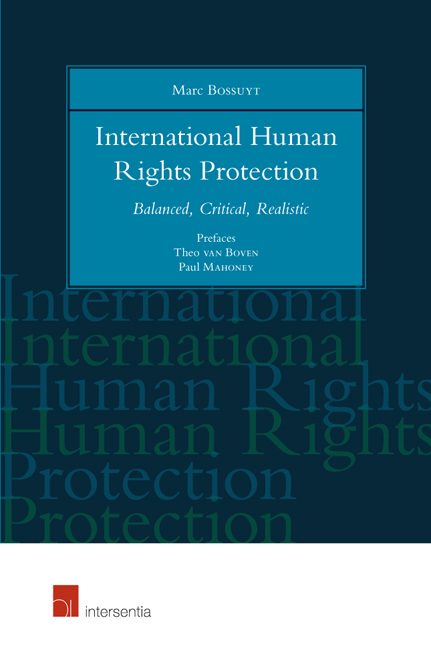Book contents
- Frontmatter
- Dedication
- Preface: A Lifetime of Fidelity and Participation
- Preface: A Penetrating and Salutary Analysis of the European System of Human Rights Protection
- Introduction
- Contents
- Epigraph
- PART ONE International Protection of Human Rights in General
- PART TWO Specific Human Rights Protection
- A Some Specific Human Rights Issues
- Chapter VIII Procedural Issues at the Durban Conference against Racism
- Chapter IX The Internal Applicability of Human Rights Treaty Provisions
- Chapter X The Death Penalty and Irreducible Life Sentences
- Chapter XI Limits to the Jurisdiction of the Court of Strasbourg?
- Chapter XII The Court of Strasbourg and Positive Obligations
- B Some Specific Human Rights Regimes
- Annex: At the Crossroads of Law and Politics
- Bibliographies
- About the Author
Chapter VIII - Procedural Issues at the Durban Conference against Racism
from A - Some Specific Human Rights Issues
Published online by Cambridge University Press: 25 September 2018
- Frontmatter
- Dedication
- Preface: A Lifetime of Fidelity and Participation
- Preface: A Penetrating and Salutary Analysis of the European System of Human Rights Protection
- Introduction
- Contents
- Epigraph
- PART ONE International Protection of Human Rights in General
- PART TWO Specific Human Rights Protection
- A Some Specific Human Rights Issues
- Chapter VIII Procedural Issues at the Durban Conference against Racism
- Chapter IX The Internal Applicability of Human Rights Treaty Provisions
- Chapter X The Death Penalty and Irreducible Life Sentences
- Chapter XI Limits to the Jurisdiction of the Court of Strasbourg?
- Chapter XII The Court of Strasbourg and Positive Obligations
- B Some Specific Human Rights Regimes
- Annex: At the Crossroads of Law and Politics
- Bibliographies
- About the Author
Summary
International protection of human rights is first of all a matter of defining international norms and setting up international systems of monitoring respect for those norms. The process of negotiating the adoption of such norms and systems takes place in political fora. Such a process is governed by procedural rules which take a prominent role when political tensions between the negotiators are high. The United Nations Commission on Human Rights, now replaced by the Human Rights Council, even the former Sub-Commission on Human Rights, but foremost the General Assembly, and its Third Committee, and Human Rights World Conferences are such political fora by excellence. By way of an example showing the importance procedural issues may have, a detailed analysis of such discussions at the 2001 World Conference against Racism, Racial Discrimination, Xenophobia and Related Intolerance is given below.
That World Conference took place at Durban (South Africa) from 31 August to 8 September 2001. The Conference was scheduled to come to an end in the evening of 7 September 2001, but as neither the Working Groups nor the Facilitators to whom some particular “difficult issues” had been entrusted could finish their work in time, the Conference lasted one day longer. In the early morning of Saturday 8 September 2001, the two Working Groups, one on the draft declaration and one on the draft programme of action, resumed their work from 7 am to 10 am. Soon aft er the closure of the Working Groups’ last meeting, the Drafting Committee, chaired by Ambassador Ali Khorram (Islamic Republic of Iran), started with the adoption of its report based on the brief reports transmitted to him by the Chairpersons/Rapporteurs of the two Working Groups. It is important to note that all those organs (the two Working Groups, the Drafting Committee, the Main Committee and the Conference) were plenary organs in which the 171 participating States were represented.
Once the report of the Drafting Committee was adopted, it was presented to the Main Committee. Three so-called difficult issues remained to be solved. Those issues related to (1) the grounds of discrimination, (2) the Middle East, and (3) the Past, which included the questions of slavery and colonialism.
- Type
- Chapter
- Information
- International Human Rights ProtectionBalanced, Critical, Realistic, pp. 91 - 102Publisher: IntersentiaPrint publication year: 2016

